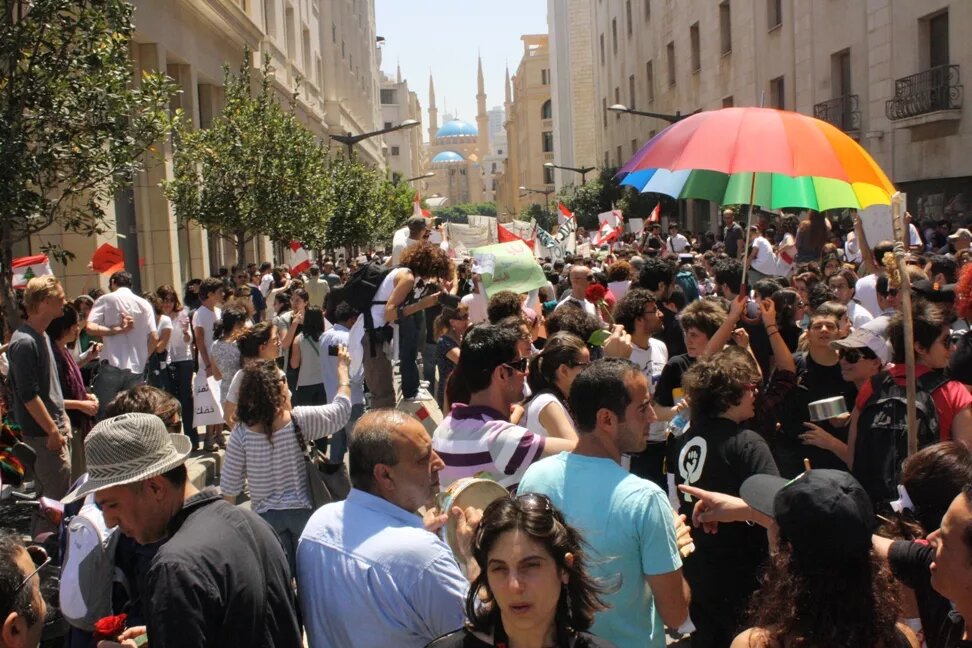
The last episode in the series of attacks against the LGBT community took place on August 9, when police raided a hammam frequented mostly, though not exclusively, by gay men. Twenty-seven men were arrested, including clients and workers at the hammam, charged with homosexuality (Article 534 of the penal code) and public indecency (Article 521).
In an interview with “L’Orient Le Jour,” a senior source in the Internal Security Forces said that the police had not intended to arrest homosexuals and were just operating under the order of the attorney general. The source also insisted that no anal probing was conducted and that the men were treated with respect.
Five days after the arrests, six men were released after making bail. The others were transferred to the Zahle prison and subjected to physical and psychological abuse by other prisoners, who were informed prior to their arrival that a group of gay men would be transferred there.
Lebanon has always been praised for being the most liberal country in the MENA region and a safe haven for lesbian, gay, bisexual, and transsexual (LGBT) individuals. However, Lebanon's gay-friendly reputation is constantly undermined by police raids and abuse against the LGBT community.
Since 2004, the year the first LGBT organization – Helem – was established, activists have been challenging the police and the institutionalized homophobia of Article 534 of the penal code, which condemns “unnatural intercourse.” The Article is commonly used as an excuse for the police to go after LGBT individuals.
Lebanese activists have won many battles; a success represented by the increased visibility of the LGBT community and the support the community is getting from both the Lebanese people and media.
Up until 2005, the police raided gay bars and clubs constantly, and people frequenting these places were arrested and subjected to physical and verbal abuse. These police practices faced little or no opposition because LGBT rights were not a priority for civil society and the media was not ready the break the taboos related to them.
This is not the case anymore. In 2012, a Beirut cinema was raided by police and 36 men believed to be engaging in gay sex were arrested. A doctor at the infamous Hbeish police station conducted invasive anal examinations to ascertain whether they had been having “unnatural” intercourse. But this time, media and civil society members unanimously and publicly expressed outrage against these practices, forcing then-Minister of Justice Shakib Qortbawi to take action and issue a circular demanding that police stop anal examinations.
Dr. Sharaf Abu Sharaf, head of the Lebanese Order of Physicians, also reacted to the outcry against these tests and announced that the practice violated Lebanese law and medical ethics, and constituted a gross violation of human rights. Dr. Sharaf added that any doctor conducting these tests would face disciplinary measures.
In 2013, The Lebanese Psychiatric Society publicly stated that homosexuality is not a mental disorder and does not require treatment. This historical statement was a gigantic step toward putting an end to the psychological violence that many LGBT individuals face when their families force them to consult abusive psychiatrists and psychologists who claim to “cure” homosexuality.
On the legal level, two significant rulings marked the LGBT movement in Lebanon, the first one in Batroun by Judge Mounir Sleiman in 2009. In his verdict, Sleiman stated: “Whereas man is part of nature and one of its elements, and a cell within a cell in it, it cannot be said that any practice of his or any behavior of his is against nature[….] therefore consensual same-sex relations are not “unnatural,” and therefore shouldn’t be subjected to legal penalty.”
Judge Naji al-Dahdah, of Jdeideh Court in Beirut, took the decision from Batroun a step further in a ruling dated January 28, 2014, when he rejected a case against a transgender woman. The woman had been accused by the state of having a "same sex relationship with a man," and in the rationale behind his ruling, Dahdah explained:
“Gender identity is not only defined by the legal papers; the evolution of the person and his/her perception of his/her gender should be taken into consideration.”
With this ruling, Judge Dahdah legitimized not only the right to have a different sexual orientation but, more importantly, the right to gender expression. This ruling is progressive even by Western standards.
There is no dispute that the situation for LGBT individuals in Lebanon is much better than it was 10 years ago, but the achievements of the LGBT community remain fragile. Article 534 (or the interpretation of it) and the failure of the Lebanese government to take radical steps to combat institutionalized homophobia continues to create space for detractors within the security and the judiciary system to violate the basic human rights and dignity of LGBT individuals.
Earlier this year, five men were arrested in the Msaytbeh neighborhood of Beirut after police had received a call informing them of “illegal activities” taking place in an apartment. According to the arrested men, the investigation centered around two key issues: figuring out the relationship of the five young men to each other; how they met; and whether they were having sex with each other.
Following the investigation, Judge Randa Yakzan ordered the police to conduct anal tests on the five men in order to “prove” their homosexuality. The tests were conducted by Dr. Ahmad al-Mokdad. Both Ms. Yakzan and Dr. Mokdad ignored the circulars issued by the Lebanese Order of Physicians and the minister of justice, not to mention the public outrage against barbaric practices.
Without a clear and official stance against these violations from the Lebanese government, security authorities and the judicial system, the LGBT community will remain at the mercy of the most corrupt and/or misinformed members of those institutions.
---
First published in NOW. on August 25, 2014

